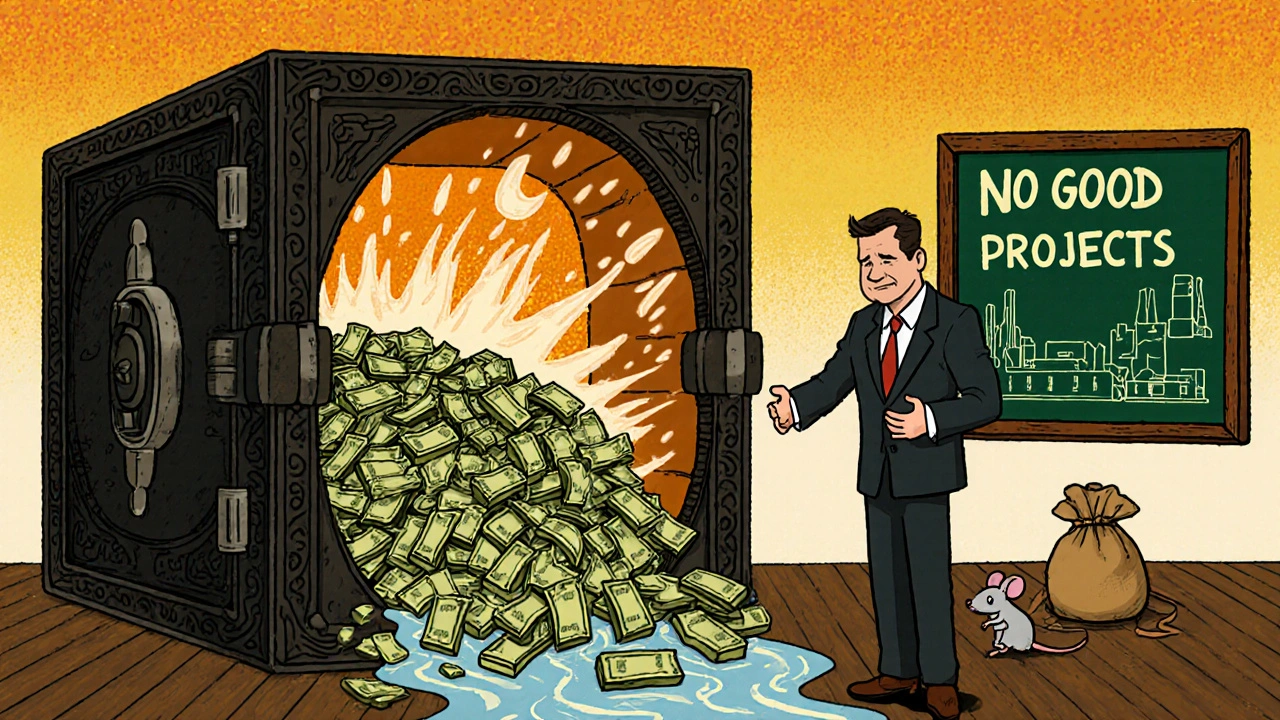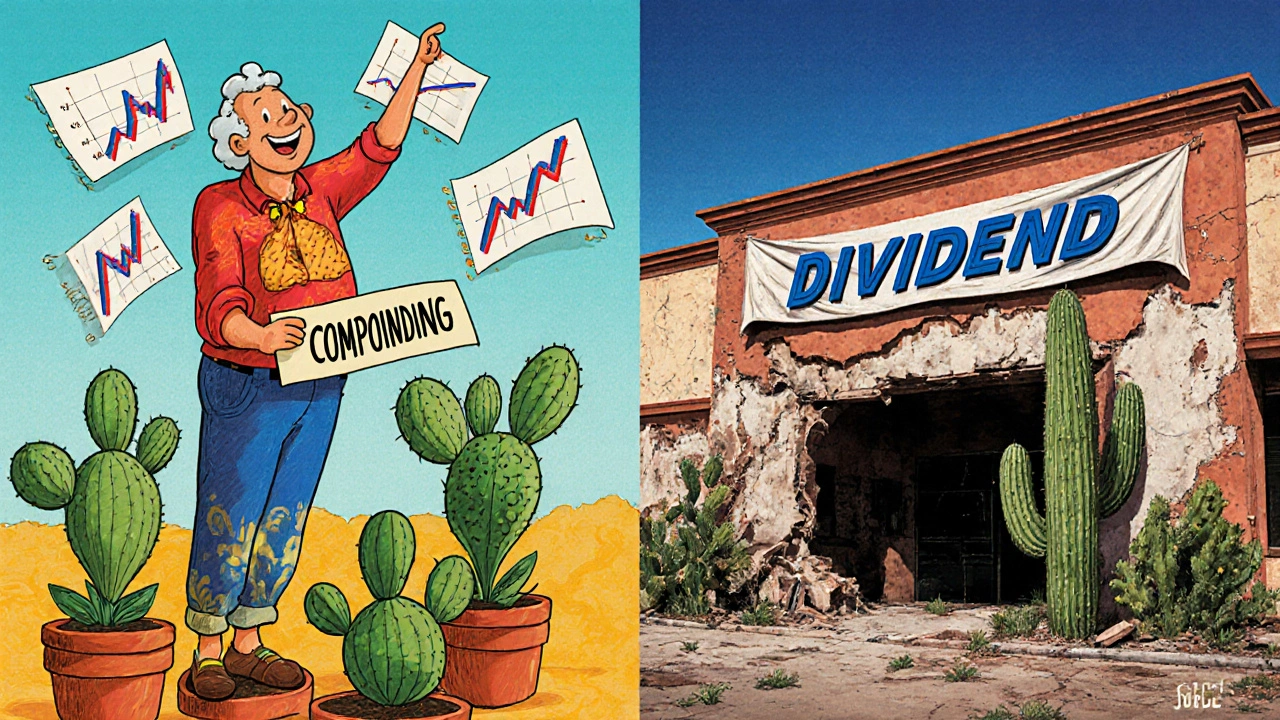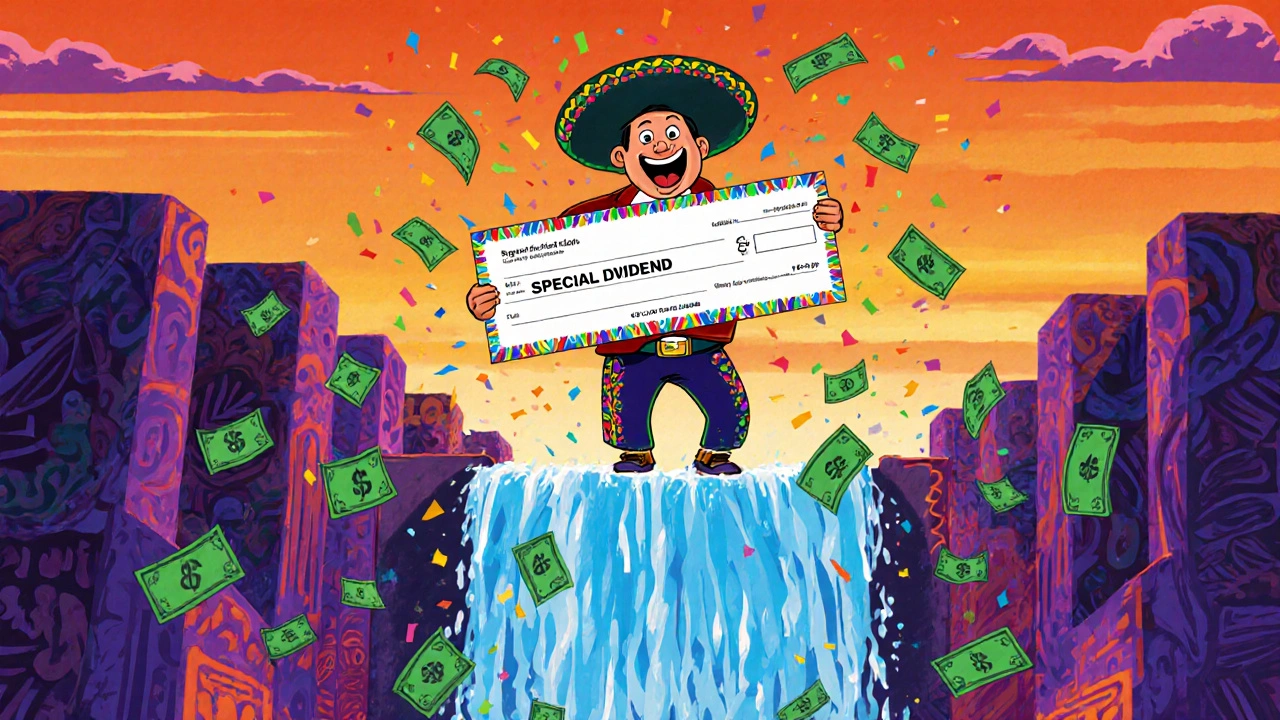Special Dividend Calculator
How Special Dividends Affect Your Portfolio
Calculate the immediate impact of a special dividend on your total investment value.
Tax Impact Calculator
When a company sends you a check that’s way bigger than your usual dividend, you might think it’s a mistake-or a windfall. But it’s not luck. It’s a special dividend, and it’s one of the most misunderstood moves a company can make. Unlike the steady quarterly payments you count on, special dividends are one-time cash gifts. They don’t repeat. They don’t come with a schedule. And they can change everything about how you think about your investment.
What Exactly Is a Special Dividend?
A special dividend is a cash payment made to shareholders outside the company’s normal dividend cycle. It’s not part of the monthly or quarterly payout you expect. It’s extra. Unexpected. And usually big.
Companies issue them when they have more cash than they know what to do with. Maybe they sold a division. Maybe profits exploded. Maybe they’re sitting on $10 billion in cash and don’t want to keep it idle. Instead of letting it sit on the balance sheet, they hand it back to you-the owner.
Think of it like this: regular dividends are your paycheck. Special dividends are a bonus you didn’t plan for. Microsoft paid $3 per share in 2004-$32 billion total. NortonLifeLock handed out $12 per share in 2020 after selling its enterprise security unit. These aren’t small changes. They’re major moves.
Why Do Companies Pay Special Dividends?
It’s not generosity. It’s strategy. Here’s why companies do it:
- Excess cash: They’ve made too much money and don’t have good places to reinvest it. Instead of hoarding cash, they return it.
- Asset sales: After selling a business unit, they have a big pile of cash with no clear use. Paying a special dividend cleans up the balance sheet.
- Capital structure shift: Reducing equity by paying out cash can lower their debt-to-equity ratio, making them look less risky to lenders.
- Tax efficiency: In some cases, paying out cash now is better than paying taxes later on retained earnings.
- Shareholder reward: Long-term investors get a surprise payout. It builds loyalty.
But here’s the catch: if a company is flush with cash and still can’t find a good way to grow, that’s a red flag. Why not invest in R&D? Expand into new markets? Buy back shares? If the answer is “we don’t have good options,” that tells you something about their future.
Special Dividends vs. Regular Dividends
It’s easy to confuse the two. But they’re completely different animals.
| Feature | Special Dividend | Regular Dividend |
|---|---|---|
| Frequency | One-time, unpredictable | Quarterly, semi-annual, or annual |
| Size | Usually much larger | Smaller, consistent |
| Predictability | Not forecasted | Often guided by management |
| Impact on Stock Price | Sharp drop on ex-dividend date | Mild, expected adjustment |
| Income Reliability | Cannot be counted on | Can be budgeted for |
| Market Signal | Excess cash or lack of growth | Stable earnings and confidence |
Regular dividends are like a steady stream. Special dividends are like a flood. One helps you plan. The other changes your life overnight.

What Happens to the Stock Price?
When a special dividend is announced, the stock doesn’t jump. It usually drops-on the ex-dividend date. Why? Because the company is giving away cash. That cash is no longer part of the company’s assets. So the value of each share goes down by the amount of the dividend.
If you own 100 shares of a stock trading at $50, and the company declares a $5 special dividend, the stock will open at $45 the next trading day after the ex-date. Your total value hasn’t changed: $5,000 in stock + $500 cash = $5,500. But now you have cash in hand.
That drop scares some investors. But it’s not a loss. It’s a transfer. The money didn’t vanish. It moved from the company’s balance sheet to your bank account.
Are Special Dividends Good or Bad for Investors?
It depends. And that’s the tricky part.
On one hand, they’re pure cash in your pocket. For retirees or income-focused investors, that’s a huge win. Reddit user ‘DividendHunter89’ said his $3-per-share payout from Microsoft in 2004 changed his life. He reinvested it and held on. That money compounded into thousands more over the next two decades.
On the other hand, growth investors see it differently. ‘GrowthInvestor2023’ on Reddit argued that Apple’s massive buybacks-not special dividends-were the smarter move. Apple used cash to reduce shares outstanding, boosting earnings per share and driving the stock higher. Special dividends don’t do that.
And then there’s Sears. In 2006, Sears paid a $12-per-share special dividend-$2.5 billion total. Investors cheered. The company looked rich. Two years later, it was in decline. By 2018, it filed for bankruptcy. The dividend didn’t mean strength. It meant the company had no future.
The lesson? Don’t celebrate the dividend. Ask why it’s happening.
Tax Implications: What You Owe
Special dividends are taxed as income. But not always the same way.
If the dividend qualifies as “qualified,” you pay 15% or 20%-the long-term capital gains rate. To qualify, you must have held the stock for more than 60 days during the 121-day period around the ex-dividend date.
If it doesn’t qualify, it’s taxed as ordinary income-up to 37% if you’re in the top bracket.
And here’s a curveball: some special dividends are labeled “return of capital.” That means the company says, “This isn’t profit. It’s your own money back.” That doesn’t trigger taxes now. But it lowers your cost basis. So when you eventually sell, your capital gain is higher-and you pay more later.
Only 43% of retail investors understand this, according to FINRA. That’s a gap. And it’s dangerous. Always check your 1099-DIV form. Your broker will tell you what type of dividend it was.

Who Issues Special Dividends-and Why?
Not all companies do this. It’s mostly big, mature ones.
- Technology: 28% of all special dividends. Think Microsoft, Intel, Oracle. They make tons of cash but don’t always need to reinvest it in new products.
- Financial Services: 22%. Banks and insurers often pay them after selling divisions or clearing out legacy assets.
- Energy: 18%. Oil and gas firms get windfalls from commodity spikes and pay out the surplus.
Companies with market caps over $100 billion issue special dividends 3.7 times more often than mid-cap firms. Why? Because they have more cash. And they’re less likely to find high-return projects to spend it on.
Private equity firms are also big users. After buying a company with debt, they often extract cash via special dividends to return money to investors. Preqin found 78% of PE-owned companies do this within 18 months of acquisition. Critics say it’s risky-draining cash from the business just when it needs to stabilize.
What’s Changing Now?
As of 2025, companies are holding a record $5.2 trillion in cash on their balance sheets. That’s up from $3.1 trillion in 2019. With interest rates still relatively high, many firms are choosing to pay out rather than invest in low-return projects.
J.P. Morgan predicts a 25% increase in special dividends over the next three years. Goldman Sachs warns that if rates stay high, companies might hold cash to pay down debt instead.
The SEC is also watching. Proposed rules in 2023 could require companies to explain why they’re paying a special dividend. Are they doing it to please shareholders? Or because they have no better ideas?
Right now, special dividends are a tool. But like any tool, they can be used wisely-or recklessly.
What Should You Do?
If you own a stock that announces a special dividend:
- Don’t panic. The stock drop is normal. Your total value hasn’t changed.
- Check the reason. Was it an asset sale? Record earnings? Or are they running out of growth ideas?
- Review the tax form. Is it qualified? Return of capital? Know what you owe.
- Decide what to do with the cash. Reinvest? Spend it? Hold it for the next opportunity?
- Don’t assume it means the company is strong. Look at debt levels, revenue trends, and management’s long-term plan.
Special dividends aren’t good or bad. They’re signals. And like any signal, you have to read the context.
For some investors, they’re a gift. For others, they’re a warning. The difference? How you think about it.
Are special dividends guaranteed?
No. Special dividends are one-time and discretionary. A company can announce one and later decide not to pay it, though that’s rare. Once declared and scheduled, it’s binding. But unlike regular dividends, there’s no expectation or obligation to repeat it.
Can I reinvest special dividends?
Yes, but not automatically. Most dividend reinvestment plans (DRIPs) only apply to regular dividends. You’ll need to manually use the cash from a special dividend to buy more shares. Some brokers let you set up automatic reinvestment for special payouts, but you have to opt in.
Do special dividends affect my cost basis?
Only if it’s classified as a return of capital. In that case, your cost basis is reduced by the amount of the return. This doesn’t trigger taxes now, but it increases your capital gains when you sell. Qualified or ordinary special dividends don’t change your cost basis.
Why don’t all companies pay special dividends?
Most companies don’t have enough excess cash. Growth companies-like tech startups or biotech firms-reinvest every dollar into R&D. Mature companies with stable cash flows are the ones that can afford to pay out. If a company has strong growth opportunities, paying a special dividend could be seen as a missed chance.
Are special dividends more common now than before?
Yes. Before 2008, companies announced about 32 special dividends per year. Since 2010, that number has jumped to over 100 annually. With record corporate cash reserves and limited high-return investment options, companies are more likely to return cash to shareholders now than in the past.

Laura W
November 7, 2025 AT 12:37Okay but let’s be real - special dividends are basically the corporate version of ‘I got a bonus, let’s go on a crazy vacation.’ Microsoft 2004? That was a flex. And honestly? If your company has $10B in cash and no idea what to do with it, maybe stop hoarding and start innovating. But hey, I’ll take the cash. My portfolio doesn’t care why you’re giving it to me - just that you are.
Also, tax implications? Please. Most people don’t even know what a 1099-DIV is. Broke investors are gonna get burned by ‘return of capital’ nonsense and then blame the market. Not cool. Always check your form. Always.
And DRIPs? Nah, they don’t auto-reinvest specials. So if you’re lazy like me, you gotta manually buy more. Which means you either forget or spend it on sneakers. No judgment. Just facts.
Graeme C
November 7, 2025 AT 12:50Let me dismantle this with surgical precision: the notion that special dividends are ‘a gift’ is dangerously misleading. They are a financial engineering tactic deployed by stagnating corporations with zero growth trajectory. Apple didn’t pay special dividends - it bought back shares, reducing float and artificially inflating EPS. That’s capital allocation with teeth.
Meanwhile, Sears? Paid a $12/share dividend in 2006 - then collapsed into bankruptcy by 2018. That’s not a windfall. That’s a funeral bell disguised as a paycheck.
And let’s not forget the tax trap: ‘qualified’ status requires holding the stock through a 121-day window. Most retail investors hold for 30 days and get slapped with ordinary income rates. That’s not a loophole - it’s a trapdoor. The SEC’s proposed disclosure rules? Long overdue. Companies should be forced to state whether the dividend reflects excess liquidity or existential decay. No more obfuscation.
Astha Mishra
November 7, 2025 AT 15:50It is truly fascinating how we, as investors, tend to celebrate the cash without questioning the silence behind it - the absence of innovation, the lack of bold expansion, the quiet retreat from risk. A special dividend is not merely money in hand; it is a mirror held up to the soul of the corporation. When a company chooses to return capital rather than reinvest it, it is confessing, in the most elegant of financial languages, that it no longer believes in its own future.
Think of it this way: a parent who gives their child a large sum of money on their birthday, not to help them build a business or pursue education, but simply because they have too much and do not know what else to do - is that generosity, or is it surrender?
And yet, for the retiree living on dividends, this cash is life. It is warmth in winter, medicine, groceries, peace of mind. So we must hold both truths: the corporate signal is ominous, but the human impact is real. Perhaps the true wisdom lies not in condemning the dividend, but in asking: what could have been, if they had dared to build something new instead?
And oh, the tax code - how it twists and turns like a labyrinth designed by bureaucrats with too much time and too little empathy. Return of capital reducing basis? Qualified vs ordinary? Most of us are flying blind, trusting brokers who themselves are overworked and undertrained. This is not finance - it is a minefield wrapped in spreadsheets.
So I say: take the dividend. Celebrate the cash. But do not forget to look beyond it. Look at the balance sheet. Look at the R&D spend. Look at the leadership’s silence. And then - then - decide whether this gift is a blessing… or a farewell.